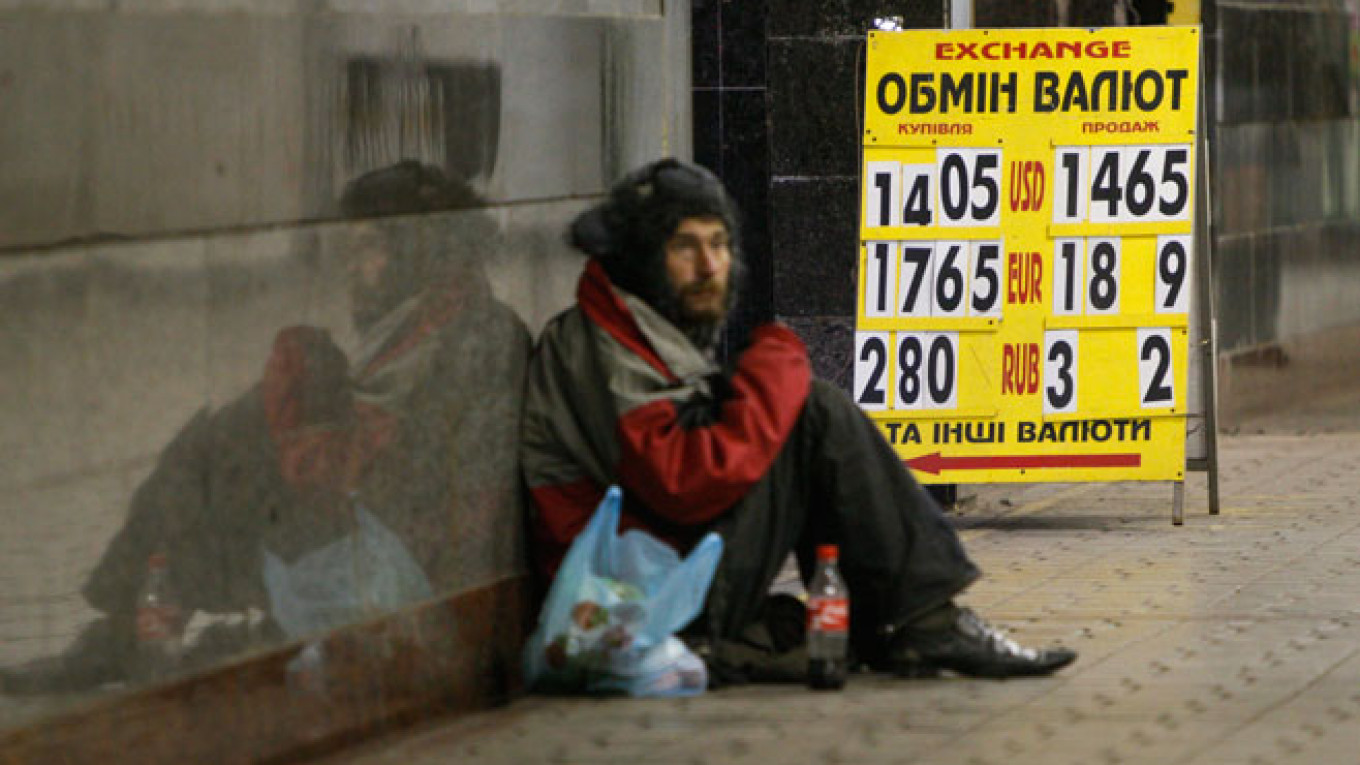Throughout the protracted crisis in Ukraine, the West has focused on Russia as the overwhelming threat to stability in the country. In September, NATO agreed to station troops in Eastern Europe on a semi-permanent basis and assist Ukraine in security sector reform, as the European Union and the United States again consider tightening economic sanctions against Russia. But focusing on sanctions and defense alone overshadows the real threat to Ukraine's future: its economy.
The EU must focus its energy on helping lift Ukraine out of decades of state failure and stagnation.
Economic fragility and domestic mismanagement have plagued Ukraine since it gained independence from the Soviet Union in 1991. Despite boasting a skilled, educated work force and vital natural resources such as metals, minerals and agriculture, the country has struggled to sustain economic growth. Meanwhile, corruption and institutional inefficiency remain major problems hampering the development of the state, making it impossible for governments over the years to implement much-needed reforms.
Ukraine's free-trade agreement with the EU gives business communities and non-state actors an important role in creating new market ties linking with European supply chains in both industrial and service sectors. Ukraine's commitment to implement the free-trade agreement with the EU is good news primarily because it bolsters economic confidence. Global markets will attach a higher degree of trust to Ukrainian goods that live up to EU quality standards.
Trade in key sectors with Ukraine will take place under the same conditions as between EU member states. This is conducive not only to exports but also the inflow of foreign investment. Ukraine's alignment with European standards covering investment protection, public procurement and competition policy will be helpful in tackling its widespread corruption problems. However, Kiev must make sure that efforts to promote trade and investments are not only looking west.
Ukraine must strike a balance between the EU and Russia, particularly in these highly polarized times. First, Ukraine should move to cooperate with the Eurasian Economic Union, which Russia has advanced as an alternative integration project to the EU. Consultations with Russia on the consequences of the implementation of the free-trade agreement were initiated too late to mitigate the crisis. Kiev must reopen dialogue with Russia about the uncertainties surrounding the economic implications of both integration projects.
Consultations also have a high degree of symbolic significance in building narratives conducive to convergence among regional integration schemes. The recent decision to postpone the application of the free-trade agreement with the EU until 2016 should not be seen as a sign of strategic weakness but as tactical diplomatic caution.
Consultations must aim to strike a new deal based on the main concerns of each party, beginning with Moscow's fears of incompatibility issues in terms of technical barriers, sanitary regulations and administrative customs procedures. This issue, in turn, must be made contingent on stable gas prices and deliveries from Russia, because Ukraine's economic output is based on major gas-consuming industries like metals, fertilizers and power generation. Kiev should also take into account that a majority of eastern Ukraine wants to maintain close economic and cultural ties with Russia and, thus, be careful in using divisive language that puts all of Ukraine's eggs in the EU's basket. Consultations must become an exercise in overcoming short-term thinking and a "winner takes it all" mentality, which for decades has perpetuated polarization in the region.
Another problem currently plaguing Ukraine is the fact that oligarchs dominate Ukrainian industry, preventing new players from entering the business field through patronage and heavy taxation. So officials must devise a comprehensive economic development plan that targets not only quick wins in strategic sectors like agribusiness and metallurgy, but also improves the investment climate for small and medium enterprises, which currently struggle to break the iron grip of a handful of powerful oligarchs.
Russia's annexation of Crimea in March and the incursion of Russian troops into the Donbass region in recent months have taken the possibility of negotiations or concessions in the military realm off the table. This is all the more reason to explore compromise or dialogue in the economic realm, which could help bring a highly volatile Ukraine down from the edge between two antagonistic trade blocs.
Military entrenchment perpetuates domestic fragility at a critical time when Ukraine simply cannot afford it. As the country tries to pull itself together under the prospect of renewed skirmishes in the east, Ukrainians need a tolerable level of social stability.
Russia is acting from a position of weakness rather than of strength and had only military means to respond to the loss of its strategically most important neighbor. The EU must address the Ukraine crisis in a political-economic context if it is going to stabilize Ukraine.
Henrik B. L. Larsen is a postdoctoral research fellow with the Harvard Kennedy School's Belfer Center for Science and International Affairs and an EASI-Hurford fellow with the Carnegie Endowment for International Peace.
A Message from The Moscow Times:
Dear readers,
We are facing unprecedented challenges. Russia's Prosecutor General's Office has designated The Moscow Times as an "undesirable" organization, criminalizing our work and putting our staff at risk of prosecution. This follows our earlier unjust labeling as a "foreign agent."
These actions are direct attempts to silence independent journalism in Russia. The authorities claim our work "discredits the decisions of the Russian leadership." We see things differently: we strive to provide accurate, unbiased reporting on Russia.
We, the journalists of The Moscow Times, refuse to be silenced. But to continue our work, we need your help.
Your support, no matter how small, makes a world of difference. If you can, please support us monthly starting from just $2. It's quick to set up, and every contribution makes a significant impact.
By supporting The Moscow Times, you're defending open, independent journalism in the face of repression. Thank you for standing with us.
Remind me later.






